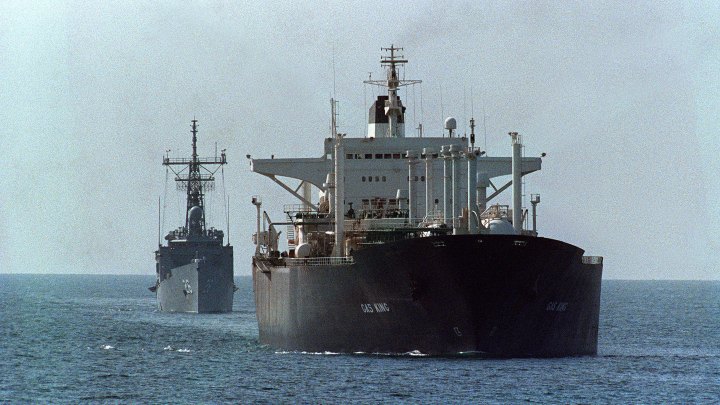
What if the U.S. stopped protecting the Strait of Hormuz?

President Donald Trump took to Twitter Monday and asked this question about the Strait of Hormuz, which connects the Persian Gulf to the open ocean:
“Why are we protecting the shipping lanes for other countries (many years) for zero compensation?”
The implication is that the United States might take a step back from securing the strait.
Last year, 21 million barrels of oil per day flowed out of the Strait of Hormuz, according to the Energy Information Administration. But these days, less than 10% of that comes to the U.S.
“Still, the U.S. is importing from the Middle East, but the dependency is not that significant,” said Sara Vakhshouri of SVB Energy.
She said that reduction in oil imports is thanks, in large part, to fracking, which has boosted domestic oil production.
Vakhshouri said a disruption could cause a slight uptick in gas prices here. But for China, Japan and India, a disruption could result in a legitimate energy shortage.
That’s why Vakhshouri thinks the administration has some leverage.
“They’re suggesting, ‘Why [should] our taxpayers … pay for the security of oil that goes to India or to China? They need to contribute,'” she said. “But I don’t think they’re suggesting that the U.S. should totally leave the Strait of Hormuz.”
But Trump did write, “All of these countries should be protecting their own ships.”
It’s unclear what the consequences would be if the United States did pull out of the strait.
“This is a very, very wide, expansive waterway that’s never really been blocked or appreciably slowed,” said Tom Kloza of the Oil Price Information Service.
“Removing it as a viable waterway to move oil would take extraordinary circumstances, and we haven’t seen those extraordinary circumstances, really, ever,” he said.
Kloza said oil traders and the news media may be exercised about the strait, but in the end, he expects we’ll be paying the same prices at the pump this summer.
There’s a lot happening in the world. Through it all, Marketplace is here for you.
You rely on Marketplace to break down the world’s events and tell you how it affects you in a fact-based, approachable way. We rely on your financial support to keep making that possible.
Your donation today powers the independent journalism that you rely on. For just $5/month, you can help sustain Marketplace so we can keep reporting on the things that matter to you.












